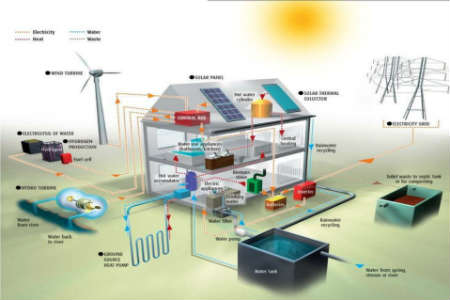In explaining the unfolding environmental problems on our planet, a lot of fingers have been pointed at energy consumption. And rightly so. Despite some misguided attempts to prove otherwise, it is now accepted that our excessive energy consumption is accelerating climate change and exacerbating environmental degradation.
Admirably, a lot of effort has been devoted to reducing the amount of energy we, as a species, are using on a daily basis. This effort collectively came from disparate backgrounds, including politicians, NGOs, the scientific community and a growing number of highly motivated, well-intentioned individuals. At the same time, a general consensus has also begun to surface regarding the solution to our problems. In a nutshell, if technology got us into this mess, perhaps technology can get us out of this mess.
Technology then has become a centrepiece of humanity’s drive to live in greater harmony with planet Earth, thus far the only planet we can call home. This is both idealistic and realistic at the same time; idealistic because we are setting very ambitious technological goals, and realistic because the only alternative to technological solutions is to give up most of the pollution-causing comforts of life we now take for granted.
Fortunately, recent innovations have come to the fore that are demonstrating very impressive cuts in energy consumption while simultaneously keeping us in the lifestyles that we’ve become accustomed to.
Why Corporations Matter: Using HVAC innovations to cut energy consumption
An estimated 25 percent of the world’s energy consumption comes from the combination of lighting plus heating, ventilation and air conditioning (HVAC) for residential and commercial buildings. Once again, individuals collectively matter. However, not many individuals are willing to live and work in the dark without heating or air conditioning. This is where technology comes into play.
Recognizing the potential for huge energy savings on a global scale, air conditioning manufacturers have taken the initiative to develop new technologies that are a lot stingier with electricity. Recent innovations in inverter technology are a great example. Inverter technology controls the cooling and heating of buildings much more intelligently than previous technologies by adapting to ambient temperatures. Energy consumption is reduced while overall performance remains stellar.
LG’s Deluxe Inverter V is an industry leader in this regard. The product shows how very clever technology can make a significant difference to the environment. This year’s Deluxe Inverter V has achieved a stunning Energy Efficiency Ratio (EER) rating of 10, Seasonal Energy Efficiency Ratio (SEER) rating of 13. In layman’s terms, this means that LG’s air conditioner is using up to 60 percent less energy than conventional air conditioners and previous models.
raditional air conditioners consume a lot of energy while they operate. One of the ways in which the Deluxe Inverter V reduces energy consumption is by delivering a superior performance in less time. Air is cooled down and heated up faster so that the required temperature is reached more quickly. Testing showed that the Deluxe Inverter V could reliably decrease a room’s temperature by five degrees Celsius in just 3 minutes, a full 20 percent faster than non-inverter models. (Leaving aside the benefits of using less energy, this faster performance is also extremely convenient for customers!
Customers get to feel better about doing their part to achieve more eco-friendly lifestyles, but they also get the enjoyment of seeing lower electricity bills each month.
The Technology in Our Lives
Whether by recycling our soda cans or by choosing a more efficient air conditioner for the office or by carpooling in our friend’s HEV, we can all find ways to make our lifestyles a little bit more eco-friendly. While the environmental problems the world faces are truly staggering, the ability of each individual to make a difference is very real.
For their part, corporations have long since recognized that in markets around the world, particularly the developed ones, consumers are becoming much more conscious of how their day-to-day lifestyle choices can hurt or help the environment. There is a growing demand among consumers for technologies that give individuals greater control over living environmentally sustainable lives, and many corporations have seized the opportunity to meet this demand.
In the end, this benefits everyone. Companies profit, individuals achieve the lifestyles they want and the planet breathes a little easier.

